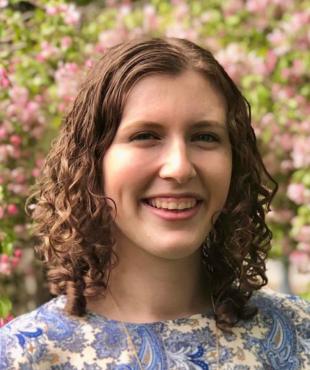
Mara Heneghan
Learning the leadership skills to address society's most pressing challenges brought Mara Heneghan to the Social Sector Leadership and Nonprofit Management (SSL) master’s program at the University of Chicago Crown Family School of Social Work, Policy, and Practice. When majoring in public policy as an undergraduate at the University of Chicago, she was drawn to social sector work for its interdisciplinary approach and its far-ranging scope across economics, policy, and community building.
Using those various disciplines to strengthen communities across Chicago and Cook County is what drives Heneghan in her current work as the director of policy for Cook County Board President Toni Preckwinkle, where she works to implement the office’s strategic policy plan.
“What’s really exciting about the work I do, and the work in the policy and social sectors more generally, is that there are so many opportunities for leadership,” Heneghan says. “Our job is not only to create programs but to figure out how to get information to people in a trusted way. This means being responsive as we learn more about what residents actually need from our programs and from the government in general.”
Working to implement programs covering rental and mortgage assistance, as well as a recently launched legal aid program that serves to further tenants’ awareness of their rights and provide free services, Heneghan has seen up close how the pandemic has laid bare the inefficiencies in past systems and the inadequate equity on which they are built.
“I’ve been really grateful for the SSL program’s focus on racial equity,” she says. “In all my classes so far, the syllabi have specifically called out areas in the literature where racism and structural inequities have impacted the way policies have developed and how those inequities have gone on to shape organizations in the social sector.”
A focus on understanding relationships
An important lesson Heneghan has learned during her career in the social sector is that power is not concentrated in any one area, such as government, philanthropy, or nonprofit work. Progressive change takes place through coordinating all three of those areas across communities and grassroots organizations.
“I think the SSL program’s focus on understanding all those relationships and preparing people to work within a social sector that is dependent on all of those different partners is really unique,” she says.
It is also essential, she believes. Unlike the corporate world, which fosters professional and leadership development, Heneghan has noticed a lack of leadership training programs in the areas she has worked. “Social sector organizations need strong leaders to be able to do this really important work,” she says. “We are creating artificial ceilings for people if we never invest in developing their leadership capacities.
“What is wonderful is that this program allows me to work full time while taking classes part-time and building these skills I know I will need.”
Hands-on knowledge to create a more inclusive society
Many of the lessons she learns in class translate directly into the challenges she faces on a daily basis. More than just conceptual tools, however, the SSL master’s program gave her the practical insight needed to lead effectively as well. Exercises in her Inclusive Leadership class, she says, gave her cohort a concrete example of the type of space leaders make for their teams so that they can collectively build strategies that enlist commitment to their work.
“It was exciting to see that play out in the classroom and think about how that could play out in a workspace or a volunteer environment,” she adds. “It applies to all types of communities that are trying to work on behalf of the public good. It forces you to think about what brings you to the work, and then also to learn how to connect that with other people’s stories and the reasons that brought them to the work.”
In the social sector world of Chicago, where so much progress is to be made by connecting and developing strategies in collaboration with other groups focused on creating a more inclusive and just society, bonding and sharing stories with a cohort—many of whom work across the social sector in Chicago—is a lesson in itself.
“I’ve been really grateful for the relationships we’ve been able to build,” she says. “If someone mentions something they are working on or even something they did that day, I might see how that connects with something I’m working on too. It is great to be in an environment where we’re all open to sharing what we know and even jumping on Zoom outside of class for fifteen minutes to quickly discuss it.
“The program is really unique in that way,” Heneghan adds. “Working full time while being in the program means the lessons we learn are immediately relevant to our work. It’s made me so excited for the long term and the paths my career will take across multiple sectors instead of strictly within one.”